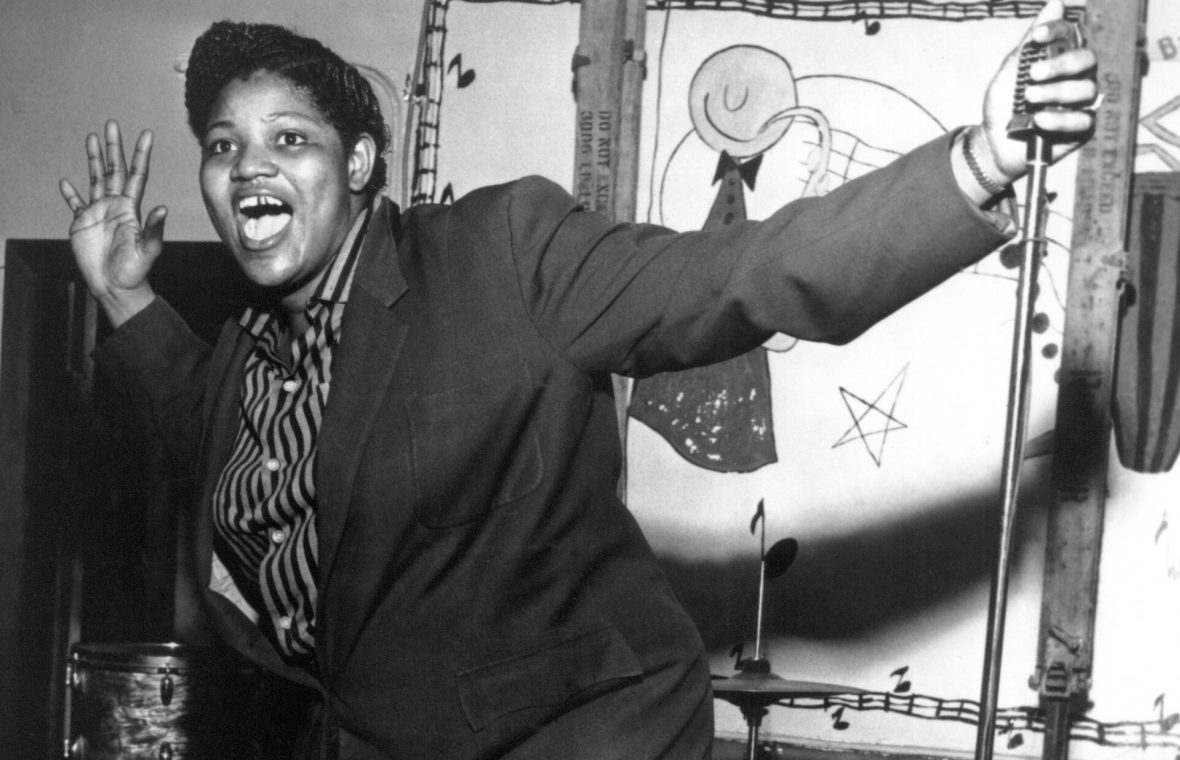2012 & 2022 Honoree
(1926-1984)

Born in the Dale County town of Ariton, Alabama, world-renowned blues singer, musician, and songwriter, Willie Mae Thornton, garnered the name “Big Mama,” both for her 300-pound frame, 6’3 build, and her powerful voice. She is best known for her 1952 rhythm and blues recording of “Hound Dog,” later recorded by Elvis Presley, and for her original song “Ball and Chain,” made famous by Janis Joplin.
Thornton was born Dec. 11, 1926, one of seven children of a minister and a church choir member. She grew up singing in her father’s church. Her mother died when she was 14 and, to help support the family, she worked cleaning up at a local bar and sometimes filled in for the bar’s singer. In 1941, she joined promoter Sammy Green’s Georgia-based Hot Harlem Revue, and her seven year tour with them gave her valuable singing and stage experience. She was billed as “the new Bessie Smith.”
In 1948 she settled in Houston, Texas, where she contributed to the development of the “Texas Blues” style. During this time she worked with bandleader Johnny Otis and black entrepreneur Don Robey, who was impressed with the self-taught drummer and harmonica player.
In 1951, Robey signed Thornton to his Peacock Records label where she recorded Jerry Leiber and Mike Stoller’s Hound Dog which was released in 1952. The B-side was “They Call Me Big Mama” and the single sold almost two million copies. Elvis Presley went on to make “Hound Dog” a rock-and-roll classic three years later, but Thornton only received $500 for her efforts.
In 1952, Thornton went with the Otis Show to play the famed Apollo Theater in New York, where she performed as the opening act for R & B artist Little Esther Phillips and Mel Walker but was quickly headlining all the shows. It was during this time that she first earned the nickname “Big Mama”.
Thornton moved to the San Francisco Bay area in the early 60s and during this time toured with shows in America and Europe. She was known for her engaging stage presence and masculine style of dress – often appearing in men’s clothes and a hat. She also played the Monterey Jazz Festival throughout the 1960s and 1970s. Many companies recorded her work, such as Arhoolie Records, which released Big Mama Thornton in Europe and Big Mama Thornton with the Chicago Blues Band. Muddy Waters, Sam Lightnin’ Hopkins, and Otis Spann appeared on the latter.
One of Thornton’s last albums was Jail recorded for Vanguard Records. It captured her performances during a couple of mid-1970s concerts at two northwestern prisons. She became the talented leader of a blues ensemble that featured George “Harmonica” Smith, as well as guitarists Doug Macleod, B. Huston, and Steve Wachsman, drummer Todd Nelson, saxophonist Bill Potter, bassist Bruce Sieverson, and pianist J.D. Nicholson.
She was a six-time nominee of a Blue music award and was elected into the Blues Foundation Hall of Fame just prior to a heart attack that led to her death on July 25, 1984. She died in Los Angeles, California at the age of 57. Her sensitive, down-to-earth voice was heard in a posthumous album, Quit Snooopin’ Round My Door, released in 1986.
Big Mama Thornton’s legacy still lives on as a pioneer for women in music, especially as an early rock n’ roll influence. She was featured in VH1’s documentary, The 100 Greatest Women of Rock & Roll (1999) and Rolling Stone’s 2002 article, “Women Who Changed the World.” She was also the inspiration for Big Mama – The Willie Mae Thornton Story, a musical written by Audrei Karen and the Willie Mae Rock Camp for Girls – a New York City-based rock camp for girls that teaches the basics of songwriting and playing instruments in a band setting.
“Back in them yesteryears -when I was comin’ up, listening to Bessie Smith and all, they sung from their heart and soul and expressed themselves. That’s why when I do a song by Jimmy Reed or somebody, I have my own way of singing it. Because I don’t want to be Jimmy Reed, I want to be me. I like to put myself into whatever I’m doin’ so I can feel it.”
-Big Mama Thornton


